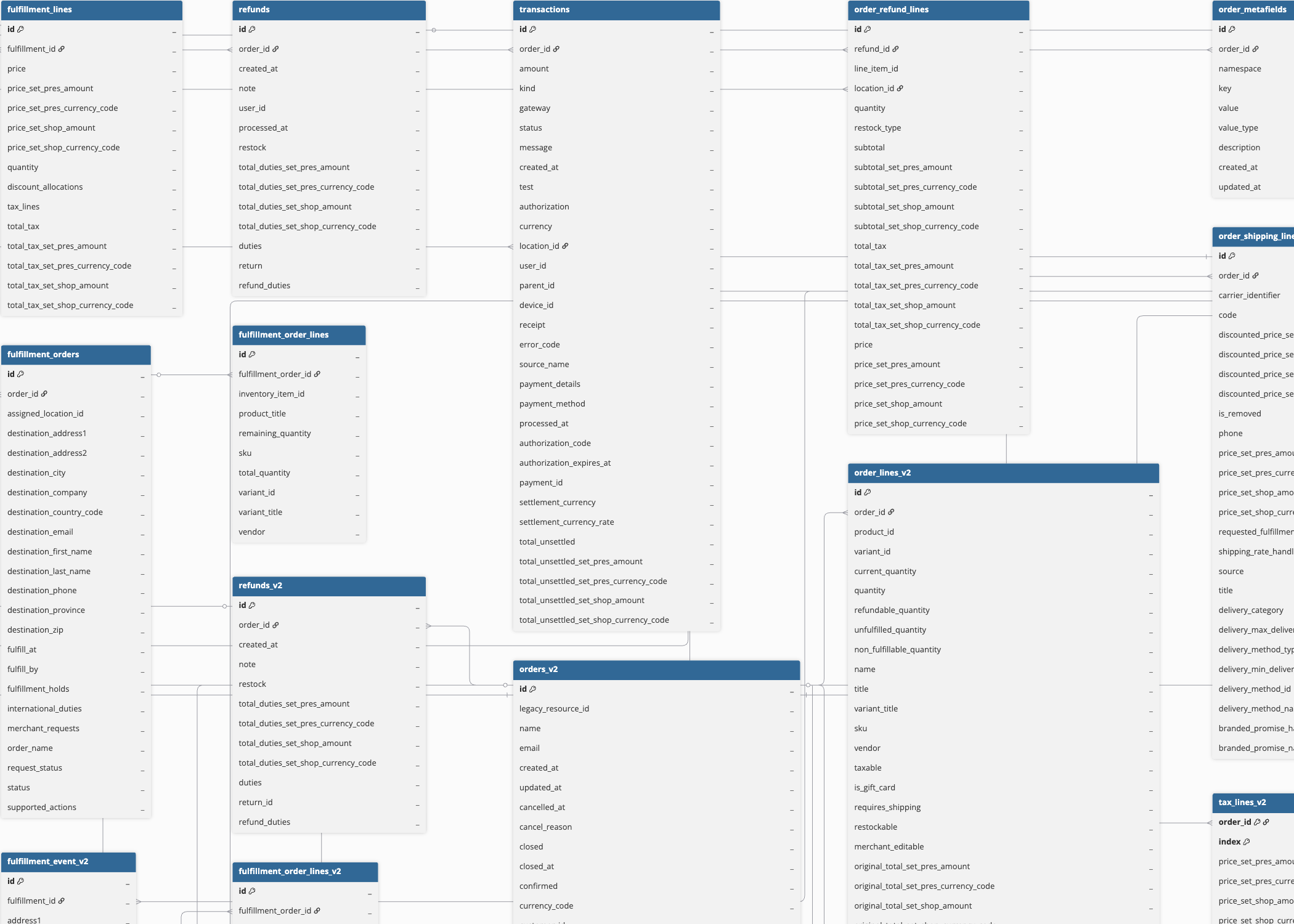- Introduction
-
Getting Started
- Creating an Account in Hevo
- Subscribing to Hevo via AWS Marketplace
- Connection Options
- Familiarizing with the UI
- Creating your First Pipeline
- Data Loss Prevention and Recovery
-
Data Ingestion
- Types of Data Synchronization
- Ingestion Modes and Query Modes for Database Sources
- Ingestion and Loading Frequency
- Data Ingestion Statuses
- Deferred Data Ingestion
- Handling of Primary Keys
- Handling of Updates
- Handling of Deletes
- Hevo-generated Metadata
- Best Practices to Avoid Reaching Source API Rate Limits
-
Edge
- Getting Started
- Data Ingestion
- Core Concepts
- Pipelines
- Sources
- Destinations
- Alerts
- Custom Connectors
-
Releases
- Edge Release Notes - February 10, 2026
- Edge Release Notes - February 03, 2026
- Edge Release Notes - January 20, 2026
- Edge Release Notes - December 08, 2025
- Edge Release Notes - December 01, 2025
- Edge Release Notes - November 05, 2025
- Edge Release Notes - October 30, 2025
- Edge Release Notes - September 22, 2025
- Edge Release Notes - August 11, 2025
- Edge Release Notes - July 09, 2025
- Edge Release Notes - November 21, 2024
-
Data Loading
- Loading Data in a Database Destination
- Loading Data to a Data Warehouse
- Optimizing Data Loading for a Destination Warehouse
- Deduplicating Data in a Data Warehouse Destination
- Manually Triggering the Loading of Events
- Scheduling Data Load for a Destination
- Loading Events in Batches
- Data Loading Statuses
- Data Spike Alerts
- Name Sanitization
- Table and Column Name Compression
- Parsing Nested JSON Fields in Events
-
Pipelines
- Data Flow in a Pipeline
- Familiarizing with the Pipelines UI
- Working with Pipelines
- Managing Objects in Pipelines
- Pipeline Jobs
-
Transformations
-
Python Code-Based Transformations
- Supported Python Modules and Functions
-
Transformation Methods in the Event Class
- Create an Event
- Retrieve the Event Name
- Rename an Event
- Retrieve the Properties of an Event
- Modify the Properties for an Event
- Fetch the Primary Keys of an Event
- Modify the Primary Keys of an Event
- Fetch the Data Type of a Field
- Check if the Field is a String
- Check if the Field is a Number
- Check if the Field is Boolean
- Check if the Field is a Date
- Check if the Field is a Time Value
- Check if the Field is a Timestamp
-
TimeUtils
- Convert Date String to Required Format
- Convert Date to Required Format
- Convert Datetime String to Required Format
- Convert Epoch Time to a Date
- Convert Epoch Time to a Datetime
- Convert Epoch to Required Format
- Convert Epoch to a Time
- Get Time Difference
- Parse Date String to Date
- Parse Date String to Datetime Format
- Parse Date String to Time
- Utils
- Examples of Python Code-based Transformations
-
Drag and Drop Transformations
- Special Keywords
-
Transformation Blocks and Properties
- Add a Field
- Change Datetime Field Values
- Change Field Values
- Drop Events
- Drop Fields
- Find & Replace
- Flatten JSON
- Format Date to String
- Format Number to String
- Hash Fields
- If-Else
- Mask Fields
- Modify Text Casing
- Parse Date from String
- Parse JSON from String
- Parse Number from String
- Rename Events
- Rename Fields
- Round-off Decimal Fields
- Split Fields
- Examples of Drag and Drop Transformations
- Effect of Transformations on the Destination Table Structure
- Transformation Reference
- Transformation FAQs
-
Python Code-Based Transformations
-
Schema Mapper
- Using Schema Mapper
- Mapping Statuses
- Auto Mapping Event Types
- Manually Mapping Event Types
- Modifying Schema Mapping for Event Types
- Schema Mapper Actions
- Fixing Unmapped Fields
- Resolving Incompatible Schema Mappings
- Resizing String Columns in the Destination
- Changing the Data Type of a Destination Table Column
- Schema Mapper Compatibility Table
- Limits on the Number of Destination Columns
- File Log
- Troubleshooting Failed Events in a Pipeline
- Mismatch in Events Count in Source and Destination
- Audit Tables
- Activity Log
-
Pipeline FAQs
- Can multiple Sources connect to one Destination?
- What happens if I re-create a deleted Pipeline?
- Why is there a delay in my Pipeline?
- Can I change the Destination post-Pipeline creation?
- Why is my billable Events high with Delta Timestamp mode?
- Can I drop multiple Destination tables in a Pipeline at once?
- How does Run Now affect scheduled ingestion frequency?
- Will pausing some objects increase the ingestion speed?
- Can I see the historical load progress?
- Why is my Historical Load Progress still at 0%?
- Why is historical data not getting ingested?
- How do I set a field as a primary key?
- How do I ensure that records are loaded only once?
- Events Usage
-
Sources
- Free Sources
-
Databases and File Systems
- Data Warehouses
-
Databases
- Connecting to a Local Database
- Amazon DocumentDB
- Amazon DynamoDB
- Elasticsearch
-
MongoDB
- Generic MongoDB
- MongoDB Atlas
- Support for Multiple Data Types for the _id Field
- Example - Merge Collections Feature
-
Troubleshooting MongoDB
-
Errors During Pipeline Creation
- Error 1001 - Incorrect credentials
- Error 1005 - Connection timeout
- Error 1006 - Invalid database hostname
- Error 1007 - SSH connection failed
- Error 1008 - Database unreachable
- Error 1011 - Insufficient access
- Error 1028 - Primary/Master host needed for OpLog
- Error 1029 - Version not supported for Change Streams
- SSL 1009 - SSL Connection Failure
- Troubleshooting MongoDB Change Streams Connection
- Troubleshooting MongoDB OpLog Connection
-
Errors During Pipeline Creation
- SQL Server
-
MySQL
- Amazon Aurora MySQL
- Amazon RDS MySQL
- Azure MySQL
- Generic MySQL
- Google Cloud MySQL
- MariaDB MySQL
-
Troubleshooting MySQL
-
Errors During Pipeline Creation
- Error 1003 - Connection to host failed
- Error 1006 - Connection to host failed
- Error 1007 - SSH connection failed
- Error 1011 - Access denied
- Error 1012 - Replication access denied
- Error 1017 - Connection to host failed
- Error 1026 - Failed to connect to database
- Error 1027 - Unsupported BinLog format
- Failed to determine binlog filename/position
- Schema 'xyz' is not tracked via bin logs
- Errors Post-Pipeline Creation
-
Errors During Pipeline Creation
- MySQL FAQs
- Oracle
-
PostgreSQL
- Amazon Aurora PostgreSQL
- Amazon RDS PostgreSQL
- Azure PostgreSQL
- Generic PostgreSQL
- Google Cloud PostgreSQL
- Heroku PostgreSQL
-
Troubleshooting PostgreSQL
-
Errors during Pipeline creation
- Error 1003 - Authentication failure
- Error 1006 - Connection settings errors
- Error 1011 - Access role issue for logical replication
- Error 1012 - Access role issue for logical replication
- Error 1014 - Database does not exist
- Error 1017 - Connection settings errors
- Error 1023 - No pg_hba.conf entry
- Error 1024 - Number of requested standby connections
- Errors Post-Pipeline Creation
-
Errors during Pipeline creation
-
PostgreSQL FAQs
- Can I track updates to existing records in PostgreSQL?
- How can I migrate a Pipeline created with one PostgreSQL Source variant to another variant?
- How can I prevent data loss when migrating or upgrading my PostgreSQL database?
- Why do FLOAT4 and FLOAT8 values in PostgreSQL show additional decimal places when loaded to BigQuery?
- Why is data not being ingested from PostgreSQL Source objects?
- Troubleshooting Database Sources
- Database Source FAQs
- File Storage
- Engineering Analytics
- Finance & Accounting Analytics
-
Marketing Analytics
- ActiveCampaign
- AdRoll
- Amazon Ads
- Apple Search Ads
- AppsFlyer
- CleverTap
- Criteo
- Drip
- Facebook Ads
- Facebook Page Insights
- Firebase Analytics
- Freshsales
- Google Ads
- Google Analytics 4
- Google Analytics 360
- Google Play Console
- Google Search Console
- HubSpot
- Instagram Business
- Klaviyo v2
- Lemlist
- LinkedIn Ads
- Mailchimp
- Mailshake
- Marketo
- Microsoft Ads
- Onfleet
- Outbrain
- Pardot
- Pinterest Ads
- Pipedrive
- Recharge
- Segment
- SendGrid Webhook
- SendGrid
- Salesforce Marketing Cloud
- Snapchat Ads
- SurveyMonkey
- Taboola
- TikTok Ads
- Twitter Ads
- Typeform
- YouTube Analytics
- Product Analytics
- Sales & Support Analytics
- Source FAQs
-
Destinations
- Familiarizing with the Destinations UI
- Cloud Storage-Based
- Databases
-
Data Warehouses
- Amazon Redshift
- Amazon Redshift Serverless
- Azure Synapse Analytics
- Databricks
- Google BigQuery
- Hevo Managed Google BigQuery
- Snowflake
- Troubleshooting Data Warehouse Destinations
-
Destination FAQs
- Can I change the primary key in my Destination table?
- Can I change the Destination table name after creating the Pipeline?
- How can I change or delete the Destination table prefix?
- Why does my Destination have deleted Source records?
- How do I filter deleted Events from the Destination?
- Does a data load regenerate deleted Hevo metadata columns?
- How do I filter out specific fields before loading data?
- Transform
- Alerts
- Account Management
- Activate
- Glossary
-
Releases- Release 2.45 (Jan 12-Feb 09, 2026)
- Release 2.44 (Dec 01, 2025-Jan 12, 2026)
-
2025 Releases
- Release 2.43 (Nov 03-Dec 01, 2025)
- Release 2.42 (Oct 06-Nov 03, 2025)
- Release 2.41 (Sep 08-Oct 06, 2025)
- Release 2.40 (Aug 11-Sep 08, 2025)
- Release 2.39 (Jul 07-Aug 11, 2025)
- Release 2.38 (Jun 09-Jul 07, 2025)
- Release 2.37 (May 12-Jun 09, 2025)
- Release 2.36 (Apr 14-May 12, 2025)
- Release 2.35 (Mar 17-Apr 14, 2025)
- Release 2.34 (Feb 17-Mar 17, 2025)
- Release 2.33 (Jan 20-Feb 17, 2025)
-
2024 Releases
- Release 2.32 (Dec 16 2024-Jan 20, 2025)
- Release 2.31 (Nov 18-Dec 16, 2024)
- Release 2.30 (Oct 21-Nov 18, 2024)
- Release 2.29 (Sep 30-Oct 22, 2024)
- Release 2.28 (Sep 02-30, 2024)
- Release 2.27 (Aug 05-Sep 02, 2024)
- Release 2.26 (Jul 08-Aug 05, 2024)
- Release 2.25 (Jun 10-Jul 08, 2024)
- Release 2.24 (May 06-Jun 10, 2024)
- Release 2.23 (Apr 08-May 06, 2024)
- Release 2.22 (Mar 11-Apr 08, 2024)
- Release 2.21 (Feb 12-Mar 11, 2024)
- Release 2.20 (Jan 15-Feb 12, 2024)
-
2023 Releases
- Release 2.19 (Dec 04, 2023-Jan 15, 2024)
- Release Version 2.18
- Release Version 2.17
- Release Version 2.16 (with breaking changes)
- Release Version 2.15 (with breaking changes)
- Release Version 2.14
- Release Version 2.13
- Release Version 2.12
- Release Version 2.11
- Release Version 2.10
- Release Version 2.09
- Release Version 2.08
- Release Version 2.07
- Release Version 2.06
-
2022 Releases
- Release Version 2.05
- Release Version 2.04
- Release Version 2.03
- Release Version 2.02
- Release Version 2.01
- Release Version 2.00
- Release Version 1.99
- Release Version 1.98
- Release Version 1.97
- Release Version 1.96
- Release Version 1.95
- Release Version 1.93 & 1.94
- Release Version 1.92
- Release Version 1.91
- Release Version 1.90
- Release Version 1.89
- Release Version 1.88
- Release Version 1.87
- Release Version 1.86
- Release Version 1.84 & 1.85
- Release Version 1.83
- Release Version 1.82
- Release Version 1.81
- Release Version 1.80 (Jan-24-2022)
- Release Version 1.79 (Jan-03-2022)
-
2021 Releases
- Release Version 1.78 (Dec-20-2021)
- Release Version 1.77 (Dec-06-2021)
- Release Version 1.76 (Nov-22-2021)
- Release Version 1.75 (Nov-09-2021)
- Release Version 1.74 (Oct-25-2021)
- Release Version 1.73 (Oct-04-2021)
- Release Version 1.72 (Sep-20-2021)
- Release Version 1.71 (Sep-09-2021)
- Release Version 1.70 (Aug-23-2021)
- Release Version 1.69 (Aug-09-2021)
- Release Version 1.68 (Jul-26-2021)
- Release Version 1.67 (Jul-12-2021)
- Release Version 1.66 (Jun-28-2021)
- Release Version 1.65 (Jun-14-2021)
- Release Version 1.64 (Jun-01-2021)
- Release Version 1.63 (May-19-2021)
- Release Version 1.62 (May-05-2021)
- Release Version 1.61 (Apr-20-2021)
- Release Version 1.60 (Apr-06-2021)
- Release Version 1.59 (Mar-23-2021)
- Release Version 1.58 (Mar-09-2021)
- Release Version 1.57 (Feb-22-2021)
- Release Version 1.56 (Feb-09-2021)
- Release Version 1.55 (Jan-25-2021)
- Release Version 1.54 (Jan-12-2021)
-
2020 Releases
- Release Version 1.53 (Dec-22-2020)
- Release Version 1.52 (Dec-03-2020)
- Release Version 1.51 (Nov-10-2020)
- Release Version 1.50 (Oct-19-2020)
- Release Version 1.49 (Sep-28-2020)
- Release Version 1.48 (Sep-01-2020)
- Release Version 1.47 (Aug-06-2020)
- Release Version 1.46 (Jul-21-2020)
- Release Version 1.45 (Jul-02-2020)
- Release Version 1.44 (Jun-11-2020)
- Release Version 1.43 (May-15-2020)
- Release Version 1.42 (Apr-30-2020)
- Release Version 1.41 (Apr-2020)
- Release Version 1.40 (Mar-2020)
- Release Version 1.39 (Feb-2020)
- Release Version 1.38 (Jan-2020)
- Early Access New
Shopify App
From Release 2.44.2 onwards, Hevo supports Shopify custom apps created using the Shopify Dev Dashboard. This update aligns with Shopify’s platform changes effective January 1, 2026, after which the creation of legacy custom apps is no longer supported by Shopify.
Impact on Existing Pipelines:
-
No user action is required for existing Pipelines.
-
Hevo will continue to replicate data using the previously configured legacy custom apps without interruption.
-
There is no downtime during this transition.
Impact on New Pipelines:
-
All new Shopify Pipelines must be configured using custom apps created through the Shopify Developer Dashboard.
-
Legacy custom apps are no longer supported for creating new Pipelines.
Shopify uses the concept of a custom app to allow access to store data for a merchant. These custom apps function exclusively for your Shopify store unlike public apps, which are built to work with many stores. The app is configured with the requisite Admin API scopes to fetch the different types of data from the store using Shopify’s REST APIs. You must install this app to set up a Pipeline in Hevo with Shopify as the Source.
The transfer of data from your Shopify store to the Destination location, therefore, comprises the following one-time setups:
-
Creating an app in Shopify.
-
Assigning permissions to the app to read and transform the data using Shopify’s Rest API.
-
Creating a Pipeline in Hevo for transferring data from Shopify to the Destination database or data warehouse.
A Pipeline only transfers data to the specified Destination. You need to use appropriate tools for transforming the data for further analysis or for publishing it through your e-commerce portal. Read Models.
Prerequisites
-
An active Shopify account from which data is to be ingested exists.
-
Data types in Source and Destination are the same.
-
You are assigned the Team Administrator, Team Collaborator, or Pipeline Administrator role in Hevo to create the Pipeline.
Perform the following steps to configure your Shopify Source:
Create and Install an App in Shopify
As a first step of replicating data from your Shopify store to the desired Destination, you must create a custom app, using which, you can make API calls to your Shopify store and fetch data. To do this:
-
Log in to your Shopify Store Admin account.
-
On the top-right corner of the page, click your store name, and then click Dev Dashboard.
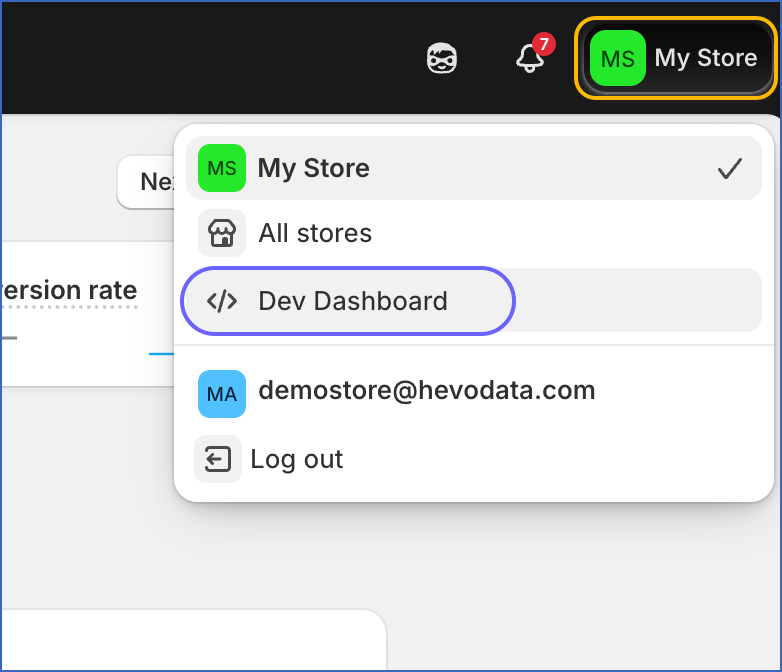
-
On the dev dashboard page, click Create app.
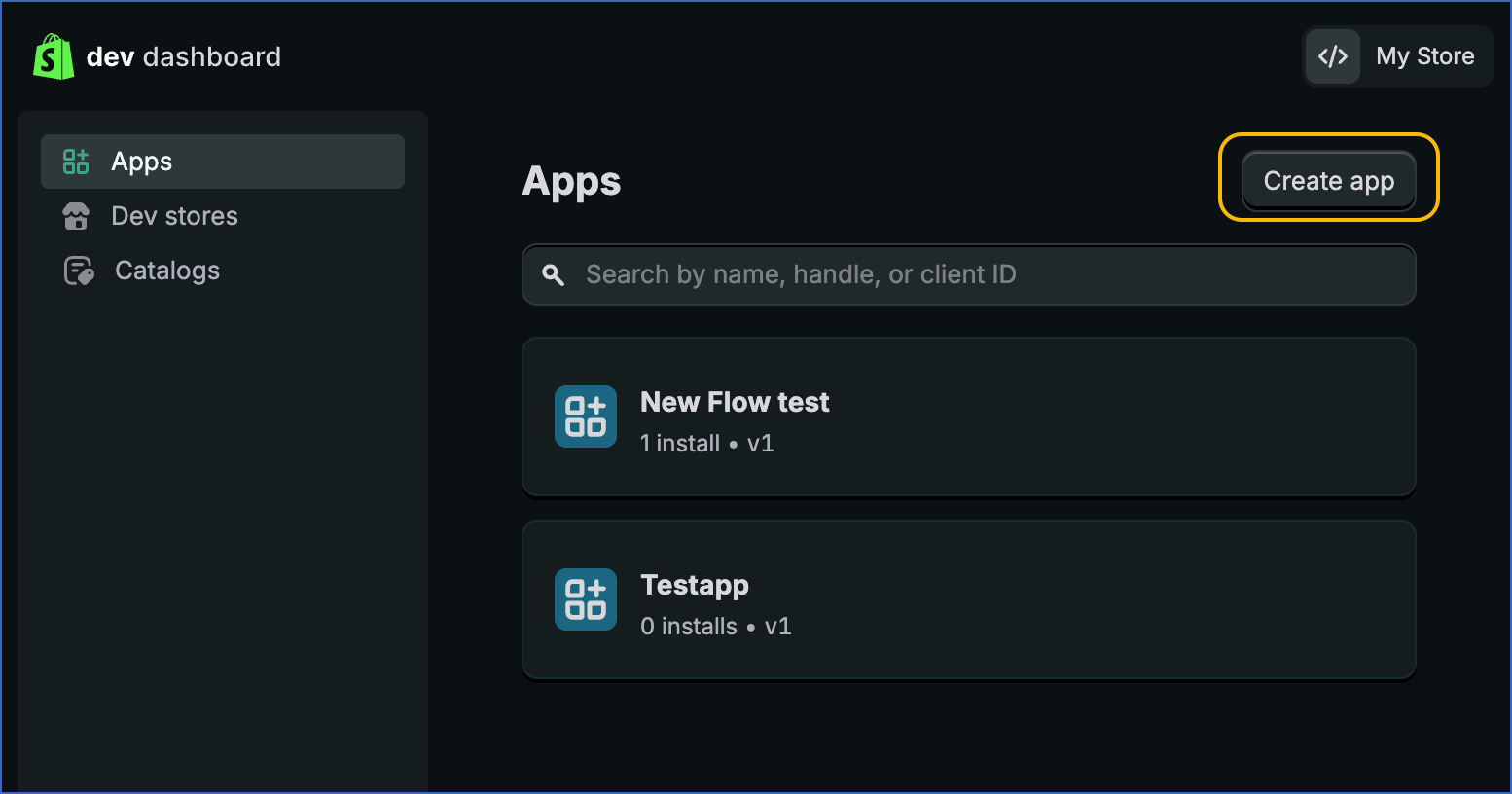
-
In the Create an app screen, provide a descriptive name for your custom app, and then click Create.
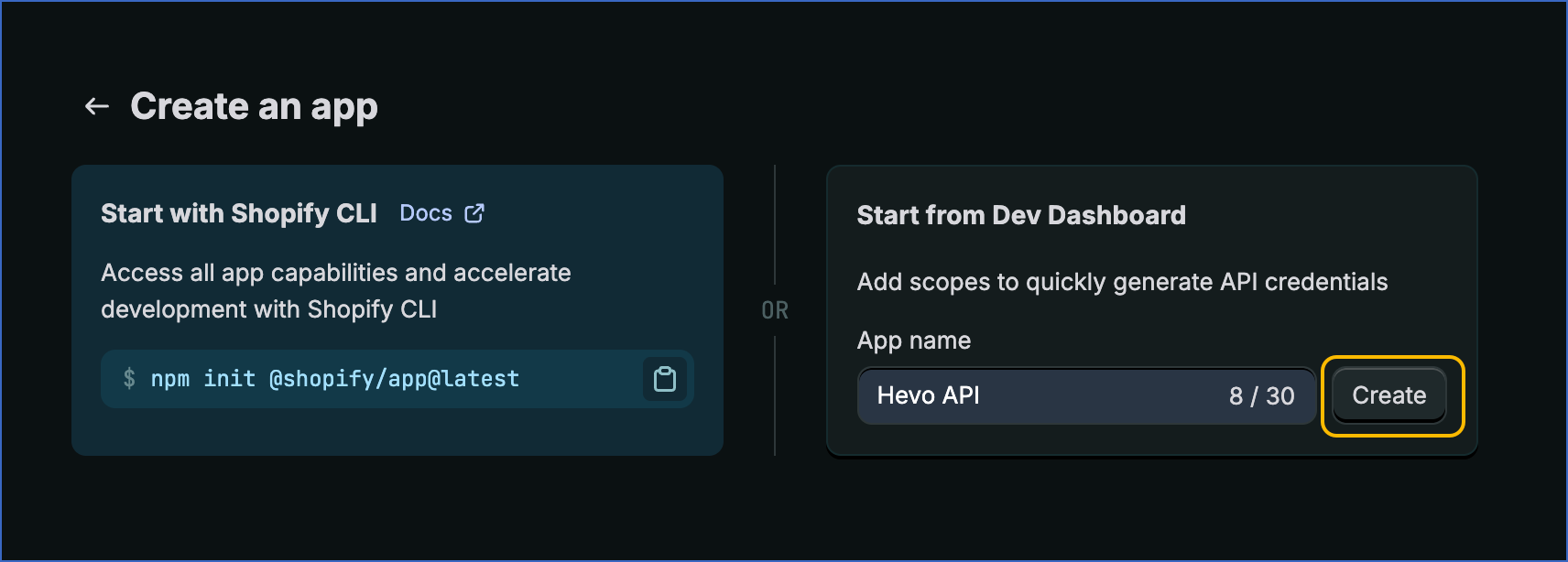
-
In the Create a version screen, enter the App URL of your Shopify App. This is the URL of your app or Shopify store homepage. If you haven’t deployed your app yet, you can use Shopify’s default App URL, https://shopify.dev/apps/default-app-home, and update it later with your own hosted URL.
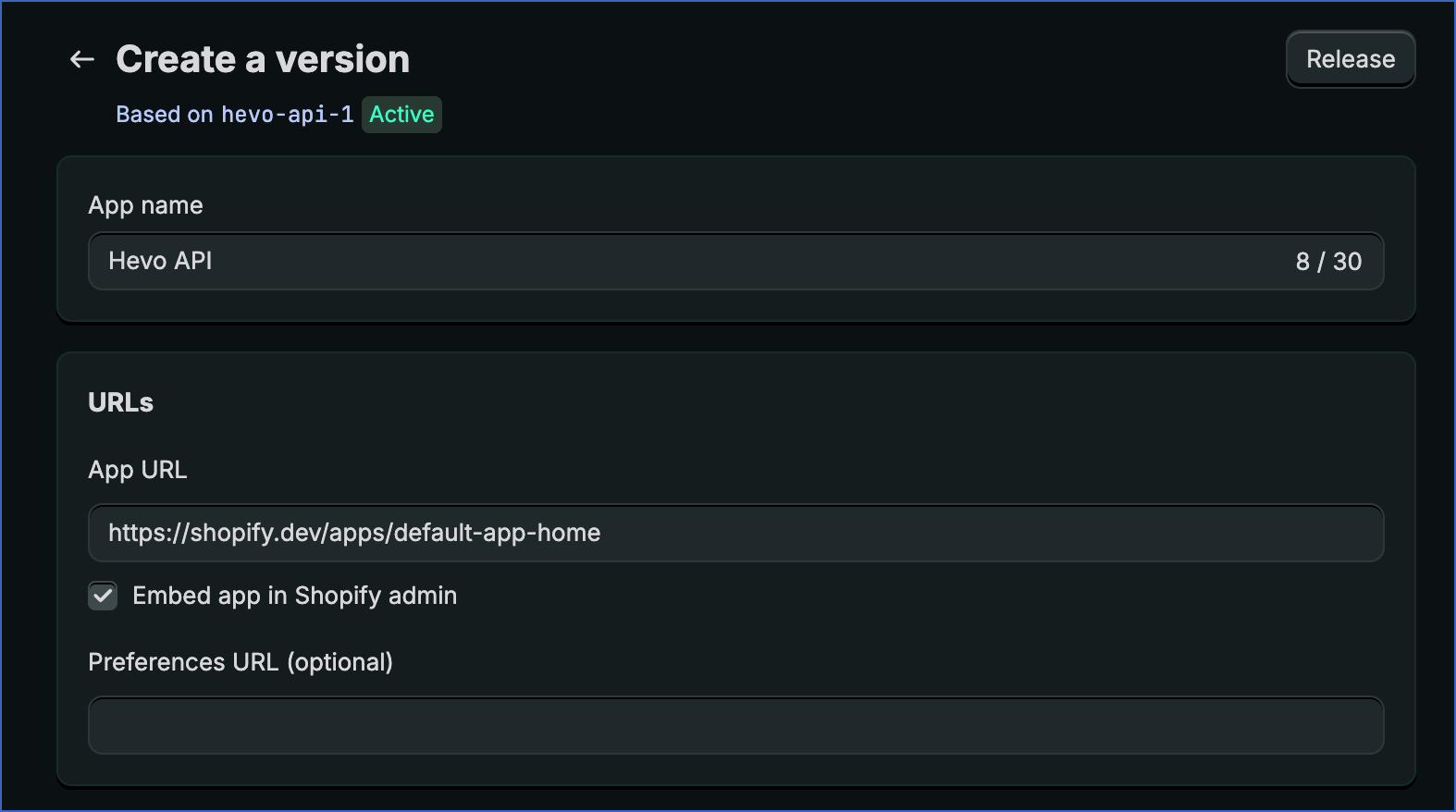
-
To configure the app to make API calls, you must grant the required permissions for the different scopes and the data within these scopes. To do this, under the Access section, click Select scopes.
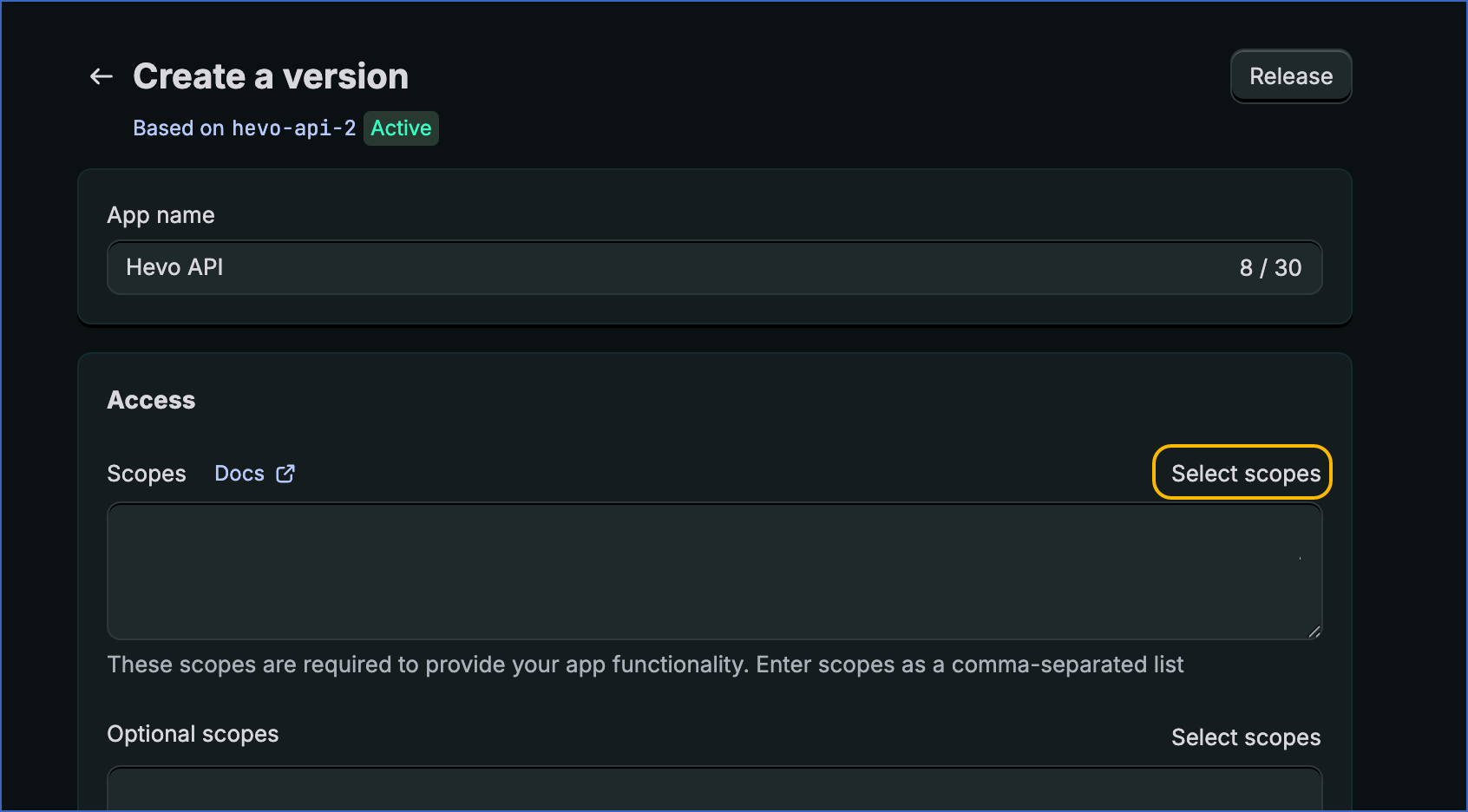
-
In the Select scopes screen, enable the read_<scope_name> check box for the following scopes to get the read access. These scopes are required to replicate all supported Shopify objects in Hevo.
-
Assigned Fulfillment Orders
-
Discounts
-
Draft orders
-
Fulfillment services
-
Inventory
-
Marketing events
-
Merchant Managed Fulfillment Orders
-
Orders
-
Price rules
-
Products
-
Product listings
-
Shipping
-
Shopify Payment disputes
-
Shopify Payment payouts
-
Third Party Fulfillment Orders
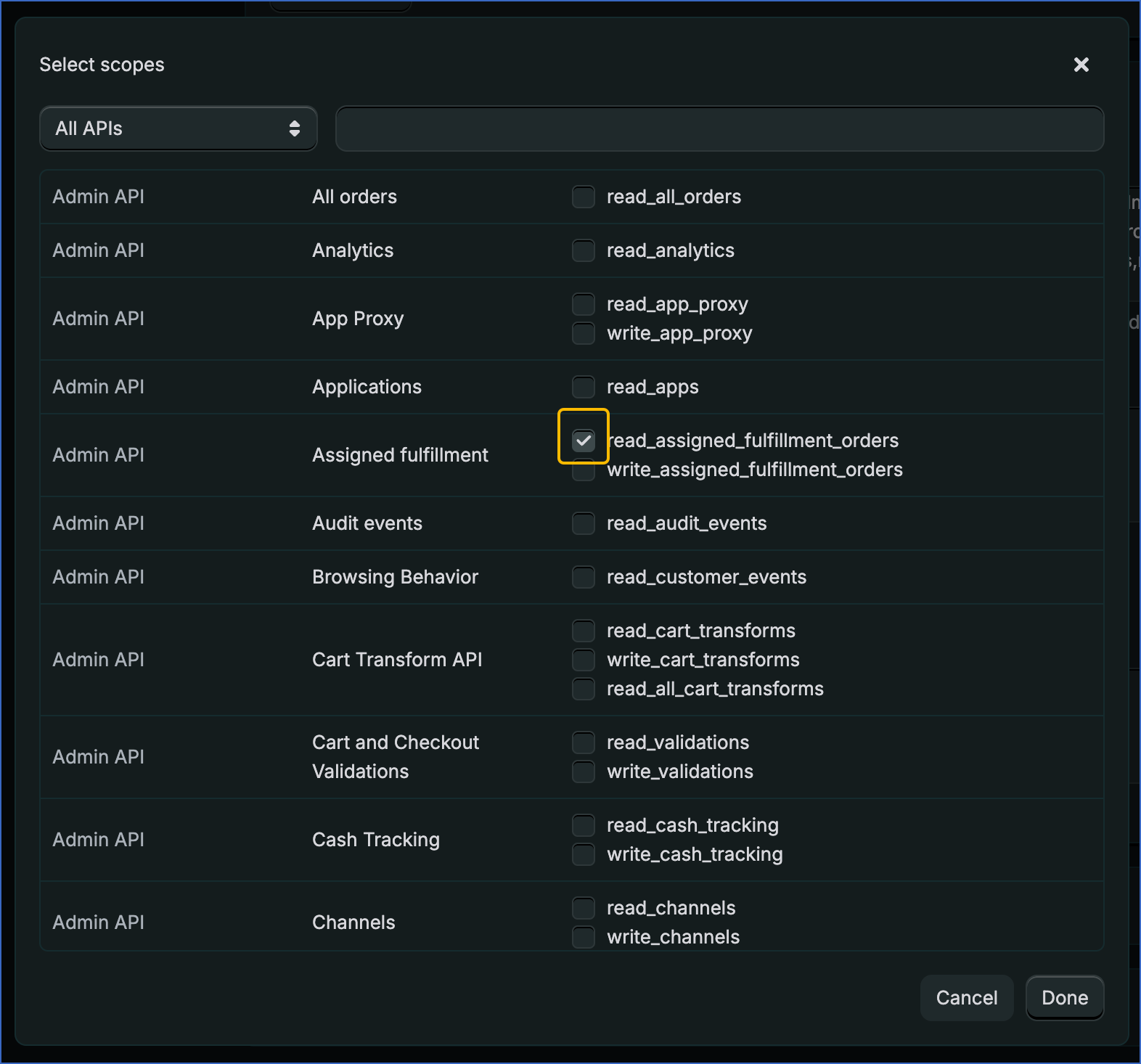
-
-
Click Done.
-
In the top-right corner of the Create a version screen, click Release.
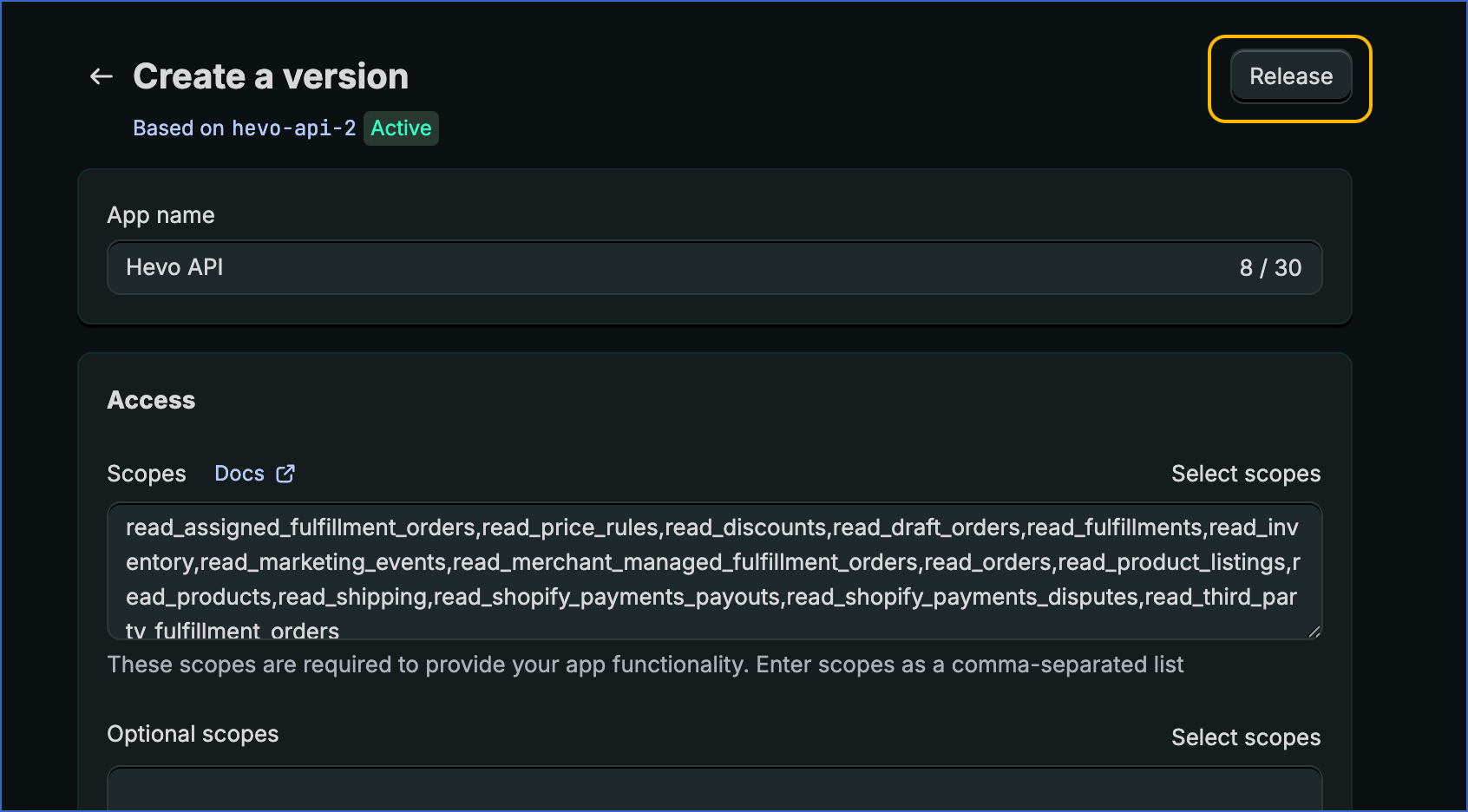
Once the version is released, the configuration is applied to your custom app. You can now proceed to install the app in your Shopify store.
-
In the left navigation pane, click Home.
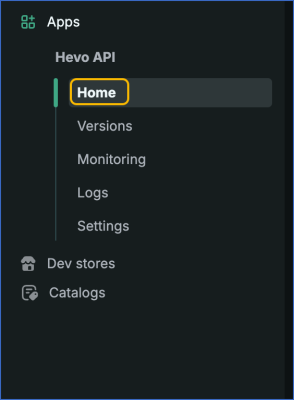
-
In the Installs section, click Install app.
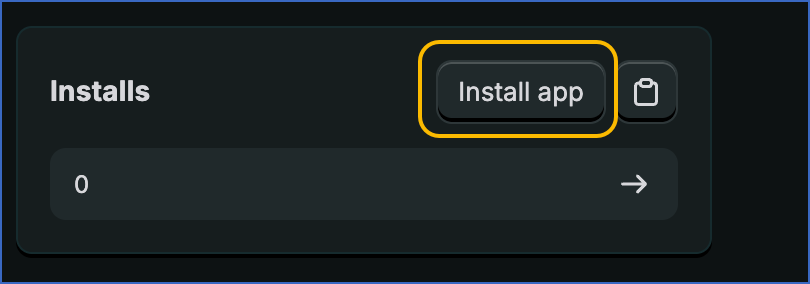
-
Select the Shopify store in which you want to install the custom app.
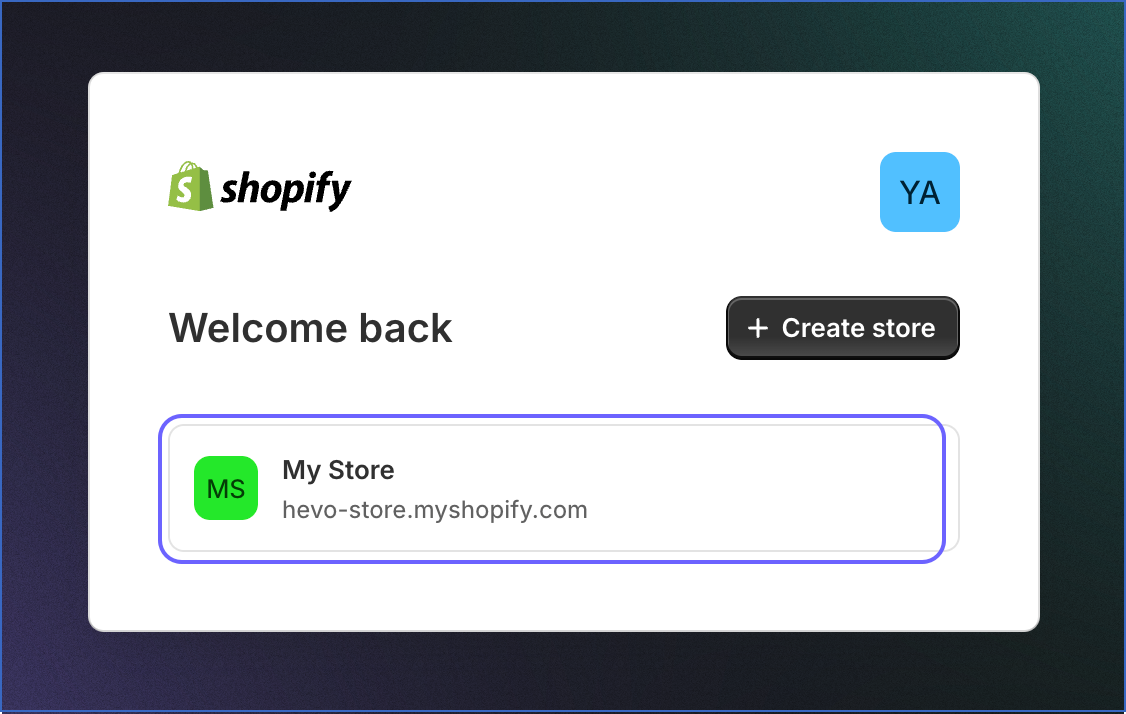
-
In the Install app screen, review the selected scopes, and click Install.
Note: To modify scopes, create a new app version, release it, and then install the latest version.
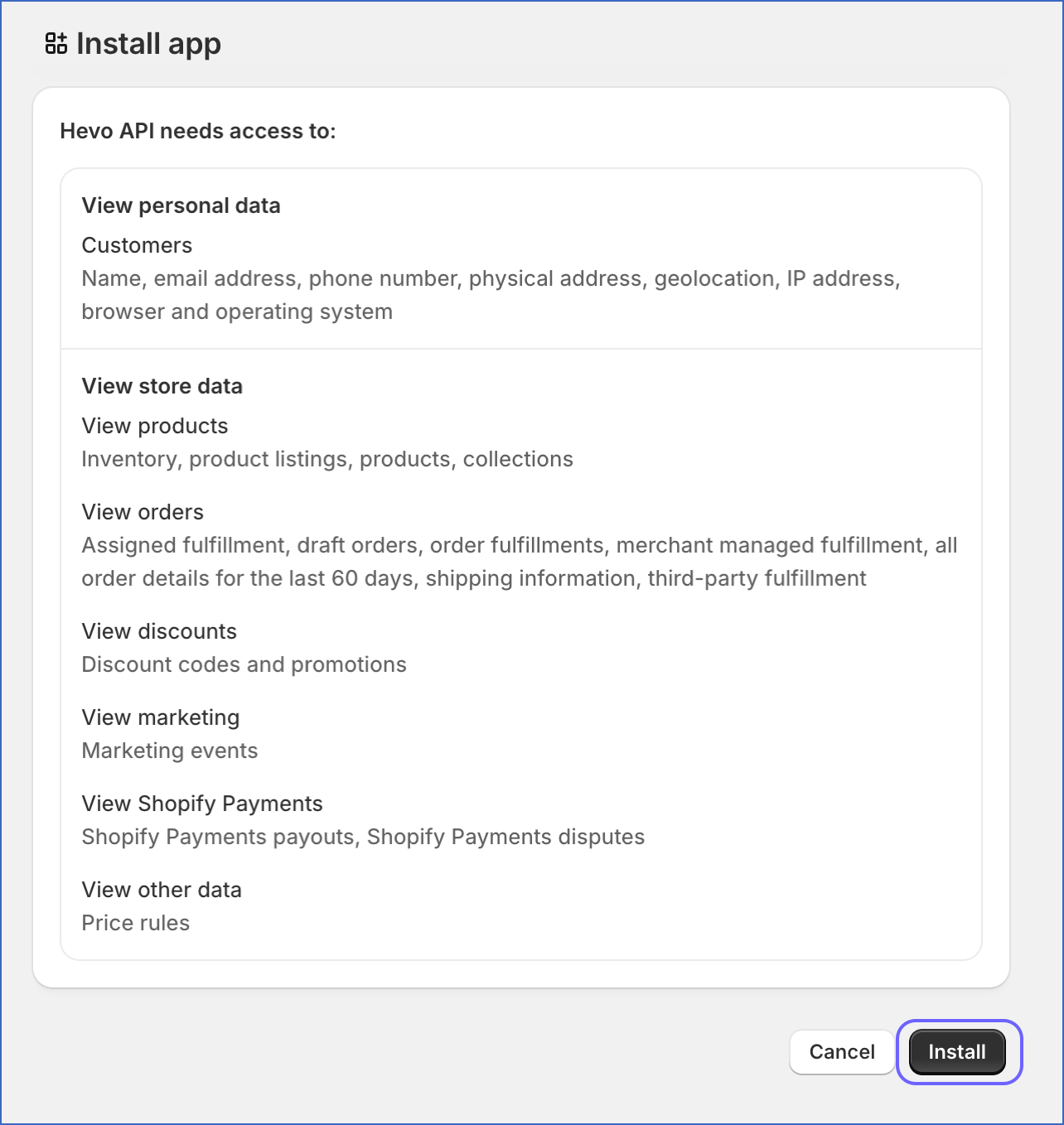
Once the app is installed in your Shopify store, you can proceed to obtain the app credentials in the next step.
Obtain Client ID and Secret
To allow Hevo to authenticate and read data from your custom app, you need to obtain the Client ID and the Client Secret. To do this:
-
On the dev dashboard page, click the app you created in Step 1 above.
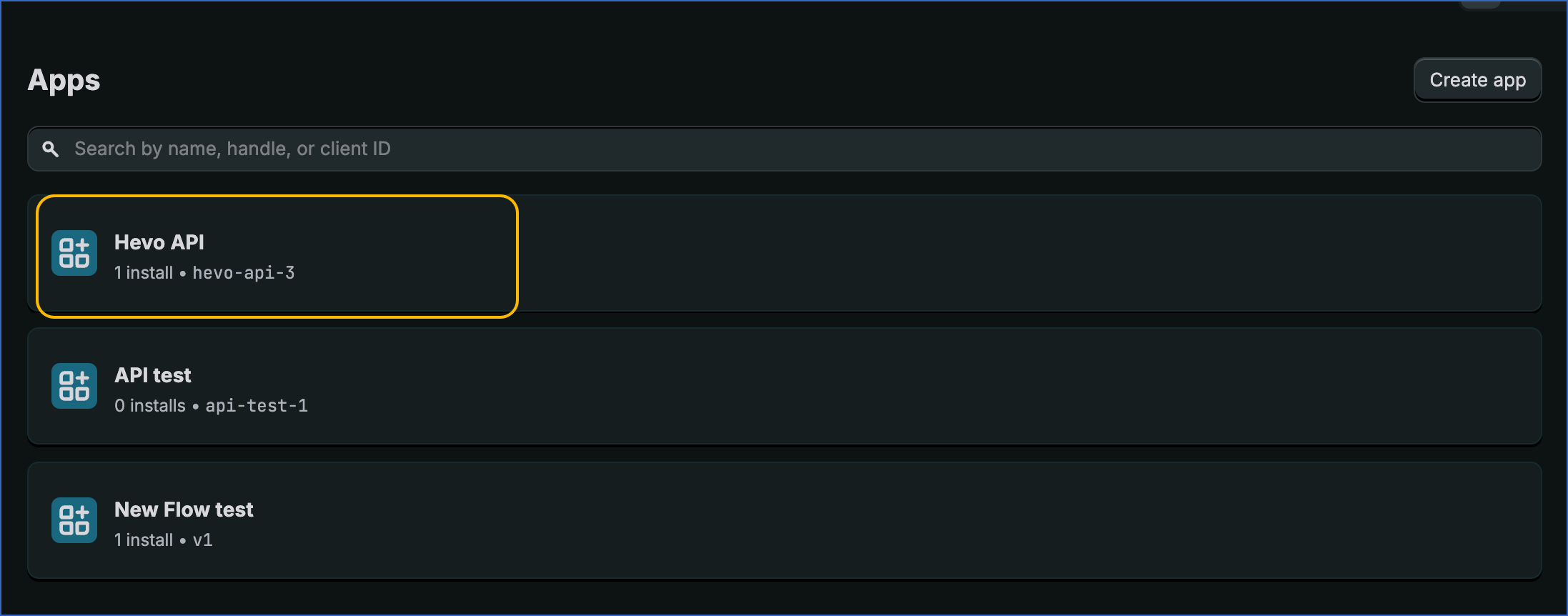
-
In the left navigation pane, click Settings.
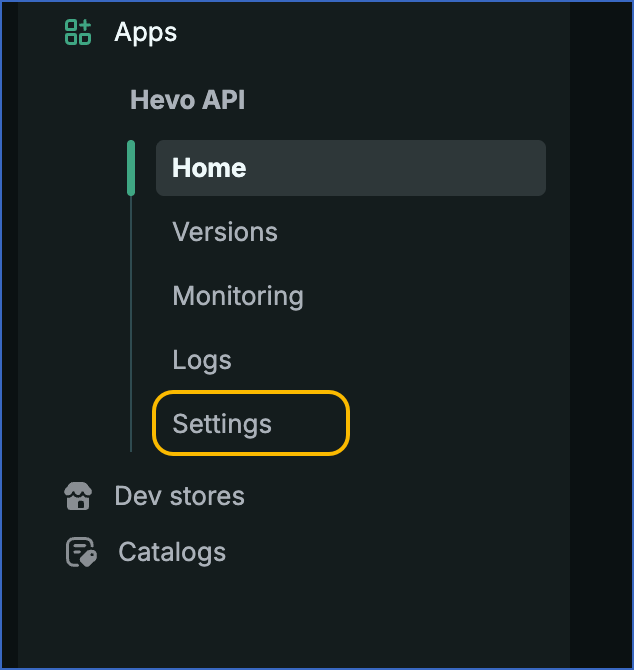
-
Under the Credentials section, copy the Client ID and Secret and save them securely like any other password.

You can use these credentials while configuring your Hevo Pipeline.
Configure Shopify Connection Settings
Once you have set up the app and generated the API credentials, create a Pipeline to complete the framework for replicating the data from Shopify into the Destination.
To do this:
-
Click PIPELINES in the Navigation Bar.
-
Click + Create Pipeline in the Pipelines List View.
-
On the Select Source Type page, select Shopify.
-
On the Select Destination Type page, select the type of Destination you want to use.
-
On the Configure your Shopify Source page, specify the following:
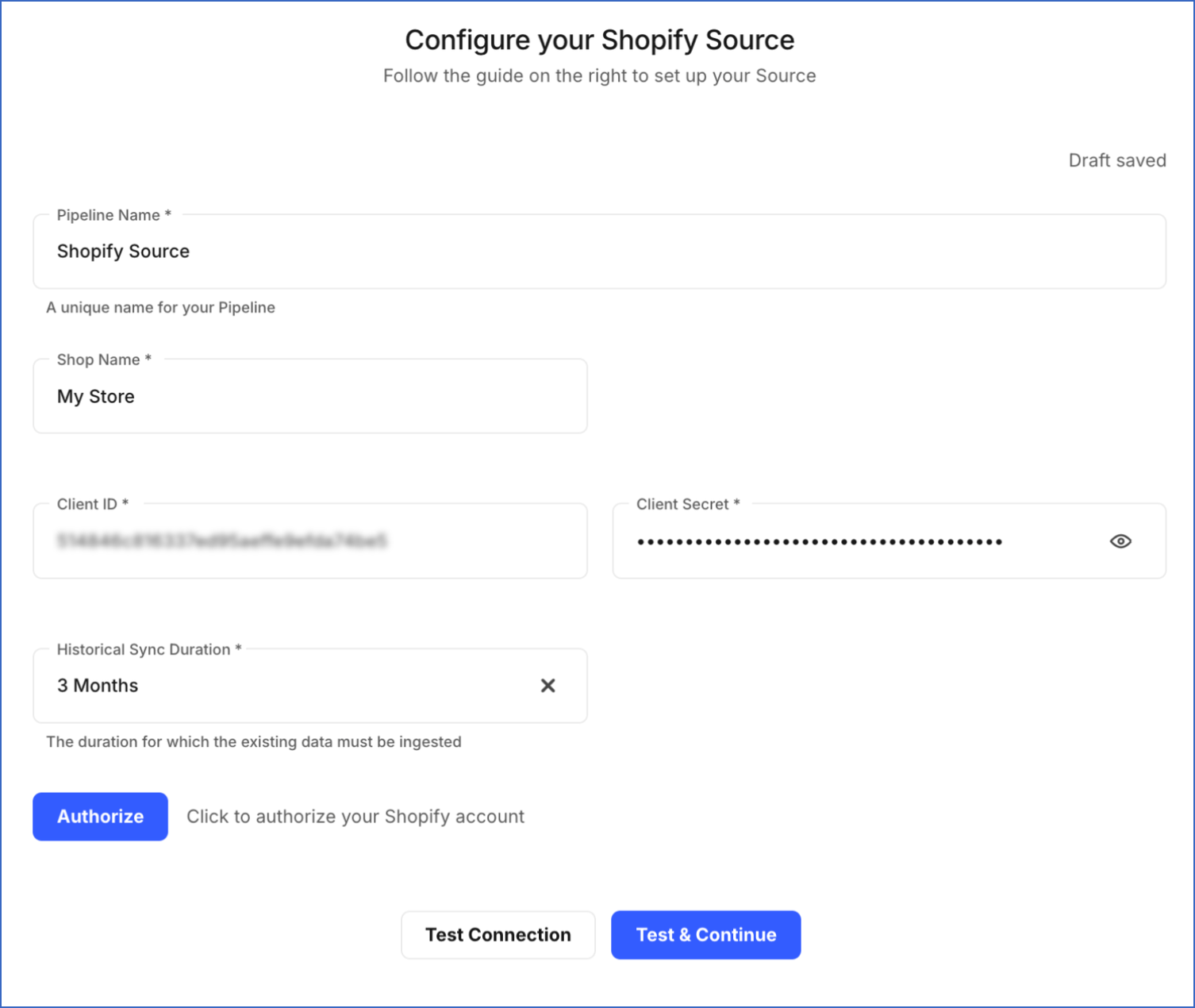
-
Pipeline Name: A unique name for your Pipeline, not exceeding 255 characters.
-
Shop Name: Your shop name. You can find this in the address bar when logged into your shop. For example, in the URL https://admin.shopify.com/store/mynewshop, the shop name is “mynewshop”.
-
Client ID: The client ID that you retrieved in Step 2 above.
-
Client Secret: The secret that you retrieved in Step 2 above.
No additional settings are needed, as Hevo connects to Shopify using the app details that you provide.
-
Historical Sync Duration: The duration for which you want to ingest the existing data from the Source. Default duration: 3 Months.
Note: If you select All Available Data, Hevo ingests all the data available in your Shopify App account since January 01, 2006.
-
-
Click Authorize to allow Hevo to connect to your Shopify app.
-
Click Test & Continue.
-
Proceed to configuring the data ingestion and setting up the Destination.
Data Replication
Note:You can transfer data of all data types.
| For Teams Created | Default Ingestion Frequency | Minimum Ingestion Frequency | Maximum Ingestion Frequency | Custom Frequency Range (in Hrs) |
|---|---|---|---|---|
| Before Release 2.21 | 10 Mins | 5 Mins | 24 Hrs | 1-24 |
| After Release 2.21 | 6 Hrs | 30 Mins | 24 Hrs | 1-24 |
Note: The custom frequency must be set in hours as an integer value. For example, 1, 2, or 3, but not 1.5 or 1.75.
-
Historical Data: In the first run of the Pipeline, Hevo ingests all the data for the selected objects in your Shopify App account.
-
For existing Pipelines: Hevo replicates object data for the past one year. Default duration: 1 Year.
-
For Pipelines created after Release 1.80: Hevo ingests historical data for all the objects on the basis of the historical sync duration selected at the time of creating the Pipeline. Default duration: 3 Months.
If you want data older or recent than this, use the Change Position option after creating the Pipeline. Hevo reloads the historical data as per the new position. If the new position is earlier than the current one and some or all of the historical data has already loaded, the consumption cost for the reloaded Events is incurred twice.
-
-
Incremental Data: Once the historical load is complete, data is ingested as per the ingestion frequency in Full Load or Incremental mode, as mentioned in the table below.
Note: From Release 1.86, Hevo ingests only new and updated data for Full Load objects to optimize the quota consumption. This feature is currently available on request only. You need to contact Hevo Support to enable it for your team.
Handling of deletes
Hevo tracks deletes for only the Product object. For this, Hevo uses the events resource that records all events like creation, update, and deletion for other Shopify resources, such as the addition of a product or the fulfillment of an order. So, whenever Hevo encounters a delete event for the Product object, the value of the __hevo__marked_deleted column for the record is set to True.
Schema and Primary Keys
Hevo uses the following schema to upload the records in the Destination database. For a detailed view of the objects, fields, and relationships, click the ERD.
Data Model
The following is the list of tables (objects) that are created at the Destination when you run the Pipeline.
Note:
-
The table names are written in small case, except for the Snowflake data warehouse tables which are written in uppercase.
-
Hevo tracks deletes for the Product object only. Refer to section, Handling of deletes.
| Object | Description | |
|---|---|---|
| Abandoned Checkout | Incremental | Contains the list of checkouts where the customer added the contact information but did not complete their purchase. |
| Application Charge | Full load | Contains details of the one-time charges paid by the merchant for their Shopify app. These charges apply to apps that are not billed on a recurring basis. |
| Application Credit | Full Load | Contains details of the credits issued to merchants that can be used for future transactions. |
| Balance | Full Load | Contains details of the current balance in your Shopify account. |
| Balance Transaction | Full Load | Contains details of funds moving in or out of your Shopify account. Note: For Pipelines created before Release 2.21, the Balance Transaction object is ingested as a child object of the Payout object. To ingest this object independently, contact Hevo Support. |
| Carrier Service | Full Load | Contains details of the shipping provider associated with your store. |
| Checkout Shipping Lines | Incremental | Contains details of the updates made to the shipping details of an order in the checkout stage. |
| Collect | Full Load | Contains details of the relationship between a product and a custom collection. |
| Custom Collection | Incremental | Contains details of the groups created by the store owner to categorize its products. |
| Customer | Incremental | Contains details of the users of a store. |
| Customer Address | Incremental | Contains details of the addresses of a customer. Each Address object can contain multiple addresses for a customer. |
| Customer Journey Summary | Incremental | Contains details about the customer’s activity on your online store. |
| Customer Saved Search | Incremental | Contains details of search query used by the store owner to search and segregate customers according to its requirements. |
| Customer Visit | Incremental | Contains details of a session of a customer visiting your store. |
| Discount Allocation | Incremental | Contains details of the discount applied to products on the basis of the associated discounts available in the store. |
| Discount Code | Incremental | Contains details of the discount codes that customers can use while placing an order. |
| Dispute | Full Load | Contains details of the customer disputes about charges. |
| Draft Order | Incremental | Contains details of the orders that the store owner creates for the customers. These orders remain in the Draft state until the payment is received by the owner. |
| Draft Order Line Item | Incremental | Contains the list of line items present in a draft order. |
| Draft Order Note Attribute | Incremental | Contains details of the notes or additional details that the customer adds to the order. |
| Fulfillment | Incremental | Contains details of the orders that you deliver to the customers from the same or different location from which they placed the order. |
| Fulfillment Lines | Incremental | Contains the list of lines items present in a fulfillment order. |
| Inventory Level | Incremental | Contains details of the quantity of each inventory item available in a specific location. |
| Inventory Location | Full Load | Contains details of the locations where a merchant has its stores, pop-up stores, headquarters, and warehouses. |
| Marketing Event | Incremental | Contains details of the marketing campaigns done by your Shopify app for your store. |
| Metafield | Incremental | Contains details of the metadata information that you can add to any Shopify object. |
| Order | Incremental | Contains details of the customer purchases from your Shopify store. |
| Order Lines | Incremental | Contains the list of line items present in an order. |
| Order Note Attributes | Incremental | Contains details of the notes or additional details specified in an order. |
| Order Refund Lines | Incremental | Contains the list of line items refunded in an order. |
| Order Risk | Incremental | Contains details of the risk assessments and fraud checks done for an order, which might cause the merchant to cancel the order. |
| Order Shipping Lines | Incremental | Contains details of the shipping costs associated with an order. |
| Payout | Full Load | Contains details of the funds transfer between a Shopify Payments account and the merchant’s connected bank account. |
| Policy | Full Load | Contains details of the policies, such as refund and privacy policies, that the merchant has configured for its store. |
| Price Rule | Incremental | Contains details of the discounts that the store owner can create for its customers. They can apply these discounts on their orders only when the terms and conditions specified by the store owner are met. |
| Price Rule PreEntitled Collection | Incremental | Contains the list of product collections eligible for a discount in your store. |
| Price Rule PreEntitled Country | Incremental | Contains the list of shipping countries eligible for a discount in your store. |
| Price Rule PreEntitled Product | Incremental | Contains the list of products eligible for a discount in your store. |
| Price Rule PreEntitled Variant | Incremental | Contains the list of product variants eligible for a discount in your store. |
| Price Rule PreRequisite Collections | Incremental | Contains the list of product collections that a customer must buy to be eligible for a Buy A Get Bdiscount. |
| Price Rule PreRequisite Customer | Incremental | Contains the list of customers eligible for a discount. |
| Price Rule PreRequisite Product | Incremental | Contains the list of products that a customer must buy to be eligible for a Buy A Get B discount. |
| Price Rule PreRequisite Saved Search | Incremental | Contains details of the customer saved searches eligible for a discount. |
| Price Rule PreRequisite Variant | Incremental | Contains the list of product variants that a customer must buy to be eligible for a Buy A Get B discount. |
| Product V2 | Incremental | Contains details of all items available for sale in a merchant’s store. |
| Product Media List | Incremental | Contains details of all media assests such as images, videos, and 3D models associated with all the products in a merchant’s store. |
| Product Variants V2 | Incremental | Contains details of the variants of the products in a merchants’ store, along with all possible combinations of these product variants. |
| Province | Incremental | Contains details of the sales tax charged from customers according to the sub-regions of the countries they place their order from. |
| Recurring Application Charge | Full Load | Contains details of the fixed charge that recurs every 30 days. |
| Refund | Incremental | Contains details of the funds returned to the customer for an order, and any updates on inventory for the line item(s) returned for that order. |
| Shipping Zone | Full Load | Contains details of the shipping rates for various countries, and provinces where the merchant sells it products. |
| Shop | Full Load | Contains details of the store(s) in your Shopify account. |
| Smart Collection | Incremental | Contains details of the product groups created by the merchant using some custom rules that he defined. |
| Tax Lines | Incremental | Contains details of the tax applied to a line item in an order. |
| Tender Transactions | Incremental | Contains details of the transfer of funds between the merchant and a customer. These transactions can be positive or negative if the funds are transferred by customer to merchant and vice-versa. |
| Transaction | Incremental | Contains details of the funds exchanged between the merchant and the customer for an order. |
| Usage Charge | Incremental | Contains details of the variable usage fee that is charged to the users along with the recurring application charge. |
Additional Information
Read the detailed Hevo documentation for the following related topics:
Source Considerations
-
In Shopify, updates to some child objects may not change the
updated_attimestamp of their respective parent objects. Hevo relies on the timestamps provided by Shopify to identify and ingest incremental data. As a result, Hevo cannot detect updates made only to a child object when Shopify does not update its parent’s timestamp. This behavior may lead to mismatches between the Source and Destination data. If you notice such a mismatch, restart the historical load for the affected object to correct the data in your Destination.For example, when a variant metafield on a product is updated, Shopify does not necessarily change the
updated_atvalue for the parent Product. As a result, Hevo does not replicate this metafield change until the parent is also updated and subsequently ingested.
Limitations
-
OAuth authentication is not supported in private apps.
-
Hevo captures deletes only for the Product object. Only deletes after Release 1.85 are captured.
-
Hevo does not capture cascading deletes of the Product object. In Shopify, a Product object can have child objects, Product Image, and Product Variant. When a product is deleted in Shopify, the associated images and variants are also deleted. However, Hevo captures the information of the deleted product only, and not the images and variants associated with it.
-
Hevo does not load data from a column into the Destination table if its size exceeds 16 MB, and skips the Event if it exceeds 40 MB. If the Event contains a column larger than 16 MB, Hevo attempts to load the Event after dropping that column’s data. However, if the Event size still exceeds 40 MB, then the Event is also dropped. As a result, you may see discrepancies between your Source and Destination data. To avoid such a scenario, ensure that each Event contains less than 40 MB of data.
See Also
Revision History
Refer to the following table for the list of key updates made to this page:
| Date | Release | Description of Change |
|---|---|---|
| Jan-29-2026 | 2.44.2 | - Updated section, Create and Install an App in Shopify and Configuring Shopify App as a Source as per the latest UI. - Added section, Obtain Client ID and Secret. - Removed section, Configure API Permissions in Shopify. |
| Jan-02-2026 | NA | Added a Source consideration about updates to child objects not affecting parent objects. |
| Nov-07-2025 | NA | Updated the document as per the latest Hevo UI. |
| Sep-18-2025 | NA | Updated section, Configuring Shopify App as a Source as per the latest UI. |
| Jul-07-2025 | NA | - Updated the Limitations section to inform about the max record and column size in an Event. - Updated section, Data Model to add information about behaviour of Balance Transaction object for older Pipelines. |
| Feb-24-2025 | 2.33.1 | - Added a warning container in page overview to mention about API upgrade. - Updated Schema and Primary Keys and Data Model as per API version 2024-10. |
| Jan-07-2025 | NA | Updated the Limitations section to add information on Event size. |
| Mar-05-2024 | 2.21 | Updated the ingestion frequency table in the Data Replication section. |
| Sep-11-2023 | NA | Added a warning container at the top of the page to mention about API migration. |
| Feb-20-2023 | NA | Updated section, Configuring Shopify App as a Source to update the information about historical sync duration. |
| Jan-23-2023 | 2.06 | - Updated section, Data Model with the two additional objects, Customer Journey Summary and Customer Visit, that Hevo now supports. - Updated section, Schema and Primary Keys to add the new ERD link with two additional objects. |
| Dec-07-2022 | NA | Updated section, Create and Install an App in Shopify according to the latest Shopify UI. |
| Oct-17-2022 | 1.99 | Updated the section, Data Model with information about the new objects that Hevo ingests. |
| Jul-27-2022 | NA | Updated Note in section, Data Replication. |
| May-23-2022 | NA | Updated sections, Create and Install an App in Shopify and Configure API Permissions in Shopify to include information about custom apps in Shopify. |
| Apr-11-2022 | 1.86 | Added a note in section, Data Replication to inform about optimized quota consumption for Full Load objects. |
| Apr-11-2022 | 1.85 | - Updated the section, Data Replication to add information about handling of deletes for the Product object. - Added limitations about capturing deletes. |
| Jan-24-2022 | 1.80 | Added information about configurable historical sync duration in the Data Replication section. |
| Oct-25-2021 | NA | Added the Pipeline frequency information in the Data Replication section. |
| Sep-09-2021 | 1.71 | Updated the section, Data Model to mention the new objects that Hevo now ingests. |
| Jul-12-2021 | 1.67 | Updated the Data Model section with additional objects that Hevo now supports and merged the Appendix into it. |
| Jun-14-2021 | 1.65 | Updated the default historical load duration to one year in the Data Replication section and suggested the Change Position option to fetch Events beyond or more recent than one year. |
